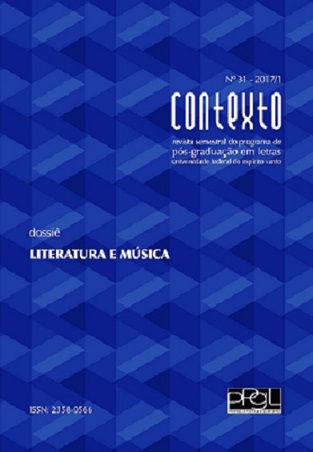O Tagore de Cecília Meireles e outros Tagores
DOI:
https://doi.org/10.47456/contexto.v%25vi%25i.14955Resumo
RESUMO: O presente trabalho apresenta a visão que a escritora Cecília Meireles (1901-1964) elaborou do poeta e músico indiano Rabindranath Tagore (1861-1941) a partir da análise de textos em que a apresentou o autor ao público brasileiro. Pretende-se demonstrar que a imagem do poeta, construída pela escritora, deixou de lado outros aspectos de seu pensamento e ação, tal como a do artista engajado que participou do movimento Swadeshi ou do pintor modernista que se tornou em idade avançada. Considerando o contexto brasileiro, pretendemos compreender o fascínio que a figura do poeta exerceu sobre Cecília e parte dos intelectuais cariocas não identificados nem com o cosmopolitismo das elites da República Velha nem tampouco com o nacionalismo dos grupos modernistas paulistanos. Conclui-se que, Cecília
iniciou um diálogo com a cultura indiana, contribuindo para o estabelecimento de uma irmandade pós-colonial entre a Índia e a América Latina que o próprio autor de Gitanjali havia desejado, mas que ainda aguarda seu momento de consolidação.
PALAVRAS-CHAVES: Tagore. Cecília Meireles. Cultura indiana. Cultura Brasileira. Póscolonialidade.
ABSTRACT: This paper presents the view that the writer Cecilia Meireles (1901-1964) produced about the Indian poet and musician Rabindranath Tagore (1861-1941) departing from the analysis of texts in which she presented him to the Brazilian public. We intend to demonstrate that the image of the Indian poet built by the Brazilian writer put aside other aspects of his thought and action, as the committed artist who participated in the Swadeshi movement or the modernist painter who he became in old age. Considering the Brazilian context, we aim to understand the fascination that the poet's figure had on Cecilia and on the group of intellectuals of Rio de Janeiro not identified with the cosmopolitanism of the Old Republic nor with the nationalism of modernist groups of São Paulo. We arrive at the conclusion that Cecilia started a dialogue with Indian culture, contributing to the establishment of a post-colonial brotherhood between India and Latin America that the author of Gitanjali had desired, but is still awaiting its moment of consolidation.
KEYWORDS: Tagore. Cecília Meireles. Indian Culture. Brazilian Culture. Post-colonialism.
Downloads
Publicado
Edição
Seção
Licença
Copyright (c) 2021 Marcus Wolff

Este trabalho está licenciado sob uma licença Creative Commons Attribution-NonCommercial 4.0 International License.

Este obra está licenciado com uma Licença Creative Commons Atribuição-NãoComercial 4.0 Internacional.





